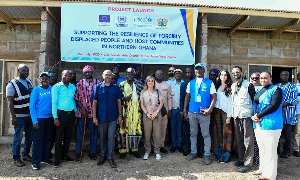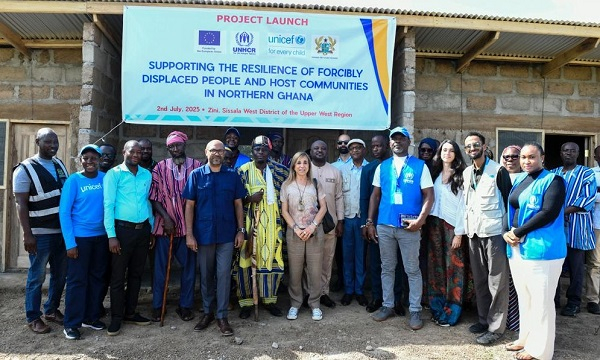 A group picture after the launch of the UNITE Project
A group picture after the launch of the UNITE Project
The European Union (EU), United Nations Children’s Fund (UNICEF), and United Nations High Commissioner for Refugees (UNHCR), the UN Refugee Agency, have launched a €2.7 million multi-donor initiative in Northern Ghana to significantly strengthen the resilience and improve the lives of forcibly displaced persons and their host communities.
The two-year Supporting the Resilience of Forcibly Displaced People and Host Communities in Northern Ghana initiative, known as the UNITE Project, co-led by UNICEF Ghana and UNHCR, is being implemented in the Tarikom and Zini communities of Ghana’s Upper East and Upper West regions, respectively.
Key areas of the intervention, which include housing and electricity, socio-economic data and national services, education and social cohesion, child protection and legal identity, water, sanitation and hygiene (WASH) and health and nutrition, aim to address the urgent needs of women and children while strengthening national systems for inclusive development.
Speaking at the launch of the project in Zini, Irchad Razaaly, the European Union Ambassador to Ghana stressed that the collaborative effort which was delivered in partnership with the Ministry of Gender, Children and Social Protection, Ghana Health Service, Ghana Education Service, National Identification Authority, and local government authorities, seeks to improve access to essential services, foster social cohesion for forcibly displaced persons and other vulnerable groups and promote long-term sustainable development, to align with national strategies and complement existing efforts like the Gulf of Guinea Social Cohesion (SOCO) programme.
“Prolonged conflict in the Gulf of Guinea has forced thousands to flee their homes, with over 17,000 asylum seekers estimated to be living in the Upper East and Upper West regions of Ghana. Through the UNITE project and other initiatives, the EU is supporting forcibly displaced people and the communities generously hosting them as they start their lives afresh.
The EU will continue to play its role on the global stage and in Ghana to uphold refugees’ rights, in line with EU and international law”, Irchad Razaaly disclosed.
Osama Makkawi Khoghali, the UNICEF Ghana representative who also spoke at the event, underscored the importance of the initiative as it is expected to restore the dignity and building the of the Ghanaian child by providing equitable access to many opportunities.
“This initiative, profoundly supported by the European Union, is about restoring dignity, strengthening community resilience and building a future where every child and family has equitable access to the services and opportunities they deserve in a dynamic and changing environment”.
On her part, Needa Jehu-Mazou, Head of the UNHCR Office in Ghana, added that her outfit is committed towards providing protection and support to forcibly displaced persons and their host communities through sustainable solutions to ensure peaceful co-existence.
“UNHCR is committed to ensuring that forcibly displaced persons and their host communities in Northern Ghana have the protection and support to not only survive but thrive.
This comprehensive programme, with the generous backing of the European Union, allows us to work collaboratively to build sustainable solutions that empower these communities and foster
peaceful coexistence”.
The EU INTPA UNITE Project is being replicated in three other countries; Côte d’Ivoire, Togo, and Benin, highlighting a concerted regional approach with a total financing amount of €12million (€10million from the EU and €2 million from four UN agencies: World Food Programme (WFP), International Organization for Migration (IOM), UNICEF and UNHCR).


